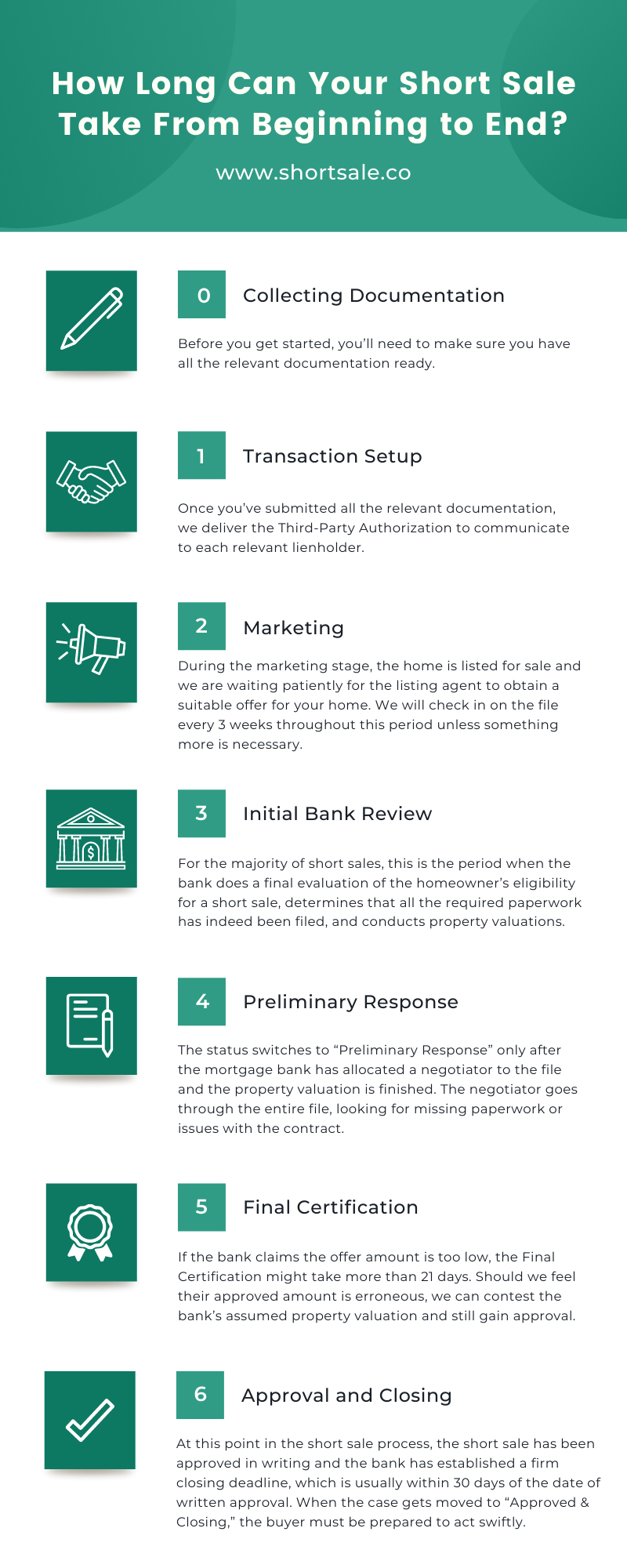Exactly how long can your short sale take from beginning to end? Getting your lender to agree to your short sale proposal can be a tremendous relief. However, various factors will shape the actual timetable, and things may take longer than you expect. Continue reading to learn more about the approximate timeline for a short sale.
Navigating the Short Sale Process
One of the best ways to navigate the entire short sale process is to work with an organization that has extensive experience handling short sales. You can certainly try to go through the process independently, but this type of real estate transaction really benefits from outside help. However, it’s important to remember that not every real estate agent or lawyer is qualified to handle short sales.
Working with Short Sale Cooperative can be highly beneficial for this very reason. We have a well-established network of specialists around the country who have substantial short sale knowledge. In fact, we collaborate with only individuals who have demonstrated records of accomplishment in completing these deals and proof of training in this niche field. Read through the stages below to get a sense of how long the short sale process could take when working with us.
Pre-List Stage: Collecting Documentation
Before you get started, you’ll need to make sure you have all the relevant documentation ready. The exact timeframe of this stage will largely depend on how quickly you can get all the essential documents together. You can’t move on to the next step until you have all the information your lender will need. We will need financial paperwork, listing agreements with the brokerage, and other miscellaneous documents, depending on the exact type of transaction. You’ll usually obtain all the paperwork before listing your home on the MLS (multiple listing service).
What Is an MLS?
A multiple listing service (MLS) is a directory developed by collaborating real estate brokers to give information about available properties for sale. An MLS enables brokers to view each other’s listings of homes for sale to connect home buyers and sellers. This service develops contractual offers of collaboration and remuneration and collects and distributes information that allows for appraisals.
Stage One: Transaction Setup
Once you’ve submitted all the relevant documentation, we deliver the Third-Party Authorization to communicate to each relevant lienholder. When your creditors accept your documentation, we will validate crucial information such as:
- Loan payoff(s)
- Delinquency status
- Foreclosure status or dates
- HOA amounts due
- Taxes due
We’ll also do a comprehensive title search to establish the existence of any additional mortgages or judgments that we did not previously identify.
Additionally, we’ll assess whether you’re eligible for special short sale programs offered by FHA, HAFA, Bank of America, or Chase during the Transaction Setup phase. If you are, we’ll then submit a request to start the short sale, even if we don’t have an offer. This can take around 5 to 10 business days from when we received all the documentation.
Stage 2: Marketing
During the marketing stage, the home is listed for sale and we are waiting patiently for the listing agent to obtain a suitable offer for your home. We will check in on the file every 3 weeks throughout this period unless something more is necessary. We’ll also perform scheduled follow-ups in which we evaluate the status of each mortgage account and any foreclosure steps the bank has taken at that time.
The duration of this step will vary depending on when an offer comes through. Anytime there’s a change, we’ll make sure to alert everyone involved.
Stage 3: Initial Bank Review
Depending on the bank, investor, and kind of short sale, several steps may occur during Stage 3. For the majority of short sales, this is the period when the bank does a final evaluation of the homeowner’s eligibility for a short sale, determines that all the required paperwork has indeed been filed, and conducts property valuations. When we get a completed contract with the addenda and paperwork, we’ll promptly send it to the relevant lienholders.
We’ll proceed to Stage 4 once we accomplish these duties and a negotiator is assigned to the case. This step can take anywhere from 21 to 45 days (about 1 and a half months) on average, though sometimes as little as 7-14 days.
Stage 4: Preliminary Response
The status switches to “Preliminary Response” only after the mortgage bank has allocated a negotiator to the file and the property valuation is finished. The negotiator goes through the entire file, looking for missing paperwork or issues with the contract. They’ll also establish the value (through either a Broker Price Opinion or appraisal) and decide on the lowest sale price the bank or investor is willing to accept. The lender will approve the buyer’s offer if it meets this minimum price. However, they could reject it if it doesn’t meet the minimum, or they could make a counteroffer.
If the buyer, seller, and the bank reach an agreement, the negotiator will submit the paperwork to the investor or a supervisor for final clearance. You should expect this to take around 10 to 14 days (about 2 weeks).
Stage 5: Final Certification
Depending on the transaction, Stage 5 could signify that we now have verbal permission. Keep an eye on our frequent updates to find out for sure. This can be a very frustrating aspect of the process. However, it can help to consider that more than 95% of transactions that achieve verbal approval at this point eventually obtain written approval unless the offer has already been deemed to be too low.
If the bank claims the offer amount is too low, the Final Certification might take more than 21 days. Should we feel their approved amount is erroneous, we can contest the bank’s assumed property valuation and still gain approval. Keep in mind that when a valuation dispute is necessary, the maximum waiting period during this stage could double.
If all goes according to plan, this stage should take 10 to 21 days. It’s only a matter of being patient and remembering that as long as approval is possible, we’ll get it for you.
Stage 6: Approval and Closing
At this point in the short sale process, the short sale has been approved in writing and the bank has established a firm closing deadline, which is usually within 30 days of the date of written approval. When the case gets moved to “Approved & Closing,” the buyer must be prepared to act swiftly. If we do not close by the deadline specified in the approval letter, we’ll need to request an extension.
Unfortunately, extensions are never assured; additional funds are occasionally necessary, and collecting them might take a while.
So how long can your short sale take from beginning to end? You should expect the whole process to take at least several months, although it can take longer, depending on the duration of each step.
We can’t overstate how having short sale experts who have successfully negotiated past short sales on your side will boost your chances of closing a deal. Contact Short Sale Cooperative today and get help every step of the way.


Recent Comments